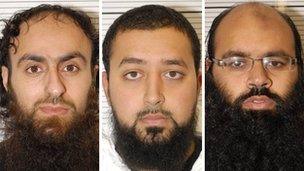Terror plot: Jail terms for Birmingham bomb plotters
- Published

Irfan Khalid, Ashik Ali and Irfan Naseer were central figures in the plot
Three members of a Birmingham terror cell have been jailed for planning an attack to rival the 7 July and 9/11 atrocities.
The group's leaders were Irfan Naseer, Irfan Khalid and Ashik Ali. Naseer, 31, was sentenced to life with a minimum of 18 years, Khalid, 28, was given 18 years and Ali 15 years.
The judge said Naseer wanted part of Birmingham to be a "little war zone".
Eight other members of the same terror cell were also sent to prison.
Rahin Ahmed was sentenced to 12 years, with a further five on licence. Ashik Ali's older brother, Bahader, was given six years. Mohammed Rizwan and Mujahid Hussain were each given four years.
Four of the group who travelled to Pakistan for terror training but had second thoughts - Ishaaq Hussain, Shahid Khan, Naweed Ali and Khobaib Hussain - were each sentenced to 40 months.
Irfan Naseer, Irfan Khalid and Ashik Ali had planned to set off up to eight bombs in rucksacks, using timers to detonate the charges.
Detectives believe the terror plot is the most significant to be uncovered since the 2006 conspiracy to blow up transatlantic airliners using bombs disguised as soft drinks.
'Skilful bomb-maker'
Assistant Chief Constable Marcus Beale said the suspects had a specific intent to commit murder
Mr Justice Henriques told Naseer during sentencing: "Your plot had the blessing of al-Qaeda and you intended to further the aims of al-Qaeda."
In February, Naseer, Khalid and Ashik Ali were found guilty of 12 counts of preparing for acts of terrorism.
They had been under police surveillance and were arrested in September 2011, amid fears an attack was imminent.
Khalid was sentenced to 18 years. He had boasted that the attack would be "another 9/11".
When sentencing him, the judge said he took into account that Khalid had been found to be in the bottom 2% to 5% in terms of cognitive ability.
Ali was jailed for 15 years. The court heard how he told police he would have donned a suicide vest and shot soldiers.
In addition to their sentences, Khalid, Ali and Rahin Ahmed have been given five years on licence, which means that if after they are released they break the licence conditions, they will be sent back to jail.
The judge singled out Naseer as the driving force behind the plot and described him as a "skilful bomb-maker".
He said: "Clearly nothing was going to stop you, short of intervention of the authorities.
"I have no doubt you would have continued with your plan but for that intervention.
"Many deaths were planned by a determined team of individuals who were fully radicalised and you, Naseer, were their leader.
"No lack of assets, skill or manpower was going to stop you."
Naseer and Khalid had received training from al-Qaeda contacts in Pakistan and had recorded martyrdom videos there before returning to the UK.
Having recruited others, the group posed as legitimate charity workers on the streets of Birmingham and collected thousands of pounds from unsuspecting members of the public.
Posing as Muslim Aid charity street collectors they raised £12,000 for themselves, but were forced to apply for tens of thousands of pounds in loans after losing more than £9,000 of the money playing foreign currency markets.
Naseer played a key role in sending Ishaaq Hussain, Khan, Naweed Ali and Khobaib Hussain to Pakistan to receive training.
But immediately on their arrival at the camp in August 2011, they began to have second thoughts. Khobaib Hussain, Ishaaq Hussain and Ali were forced to return just three days later after a relative got wind of the real reason for their journey.
"All four of you took the decision not to proceed with terror training and all four of you realised what a shocking mistake you had made," Mr Justice Henriques said as he sentenced them.
"But it is a chilling thought that unbeknown to your parents you left this country intending to undergo a period of terror training."
Forty Muslim community groups in Birmingham distanced themselves from the action of the group.
They issued a statement which said: "We have consistently opposed and openly challenged individuals and organizations preaching messages of hate and division."
At the end of the sentencing, the judge called the standard of police work that led to the capture of the group "exemplary".
- Published26 April 2013
- Published21 February 2013
- Published26 April 2013
- Published21 February 2013
- Published21 February 2013